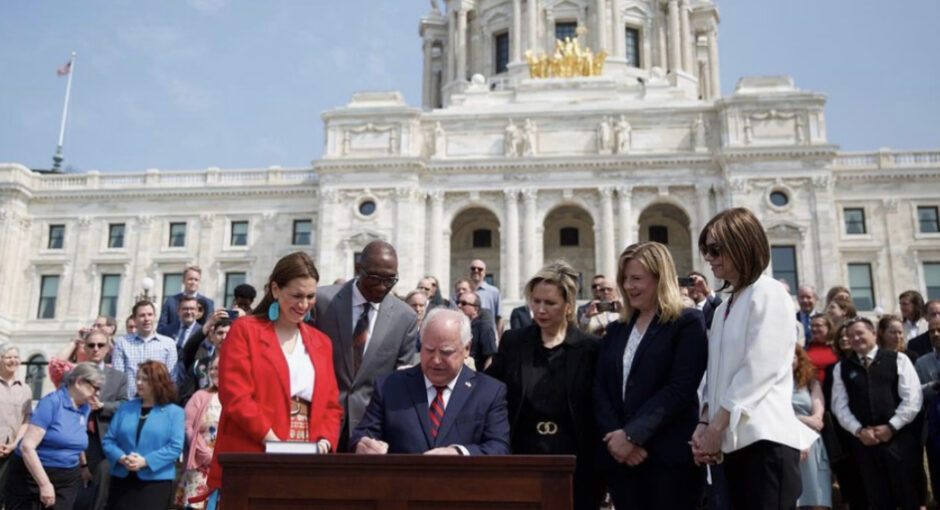Minnesota health care providers were shocked to learn that a bill signed into law in late May made their state the first to require all 340B covered entities to report their total 340B drug acquisition costs and payments.
The first annual 340B transparency reports are due on April 1, 2024. The requirements are on page 685 of a 909-page health care finance bill, one of 12 Gov. Tim Walz (D) signed on May 24 that form a $72 billion state budget package for the next two years.
The 340B reporting requirements were disclosed on the last day of Minnesota’s legislative session, just days before the bill became law. Hospitals and community health centers say they were caught off guard by the language in the bill and did not have sufficient time to convene and suggest amendments.
The legislation contains eight new reporting requirements, including the total acquisition cost for 340B drugs, the total payment received for these drugs, and the total payment made to contract pharmacies to dispense 340B drugs. These requirements apply to all 340B covered entities. Hospitals must additionally report acquisition costs and payments at the national drug code level for their most frequently used drugs.
‘Under the radar’ passage
Despite the bill’s significance to 340B covered entities, they say they were unaware of the language pertaining to 340B reporting requirements until around 24 hours before it passed the Minnesota House and Senate. This “under the radar” addition has prompted hospitals and community health centers to quickly work to convene a coalition of 340B entities and coordinate government responses.
The first four versions of the bill, which originated in the Senate on March 20, did not contain any mention of the 340B program. After the Senate passed the fourth version on April 19, the House subsequently rejected the bill. A conference committee then met and drafted the fifth and final version, which included the first references to 340B reporting requirements. That version of the bill first became public on May 21, and both the House and Senate passed the legislation on May 22.
It remains unclear what prompted the conference committee to add the new 340B provisions in the final version of the law. It consisted of five state representatives—Tina Liebling (D), Robert Bierman (D), Dave Pinto (D), Heather Keeler (D), and Joe Schomacker (R)—and five state senators—Melissa Wiklund (D), Kelly Morrison (D), Liz Boldon (D), Robert Kupec (D), and Jim Abeler (R).
The bill narrowly passed 34-32 in the Senate and 69-64 in the House, both of which are controlled by Democrats. The bill also includes provisions to expand Minnesota’s state subsidized health insurance program MinnesotaCare, repeal multiple abortion restrictions, and add funding for mental health services.
More questions than answers
After the surprise passage of 340B reporting requirements, healthcare providers say they have “more questions than answers” as concerns loom over the bill’s implementation. One community health center representative says the bill contains around 10 provisions, including the 340B requirements, that will have a “profound impact” on Minnesota’s health centers. A hospital representative says they are still digesting the full impact and context surrounding the new transparency requirements, which comprise just one page of the 909-page legislation.
The specific reporting measures included in the law, which apply to all 340B covered entities, must be reported from the previous year to the commissioner of health by April 1 of each following year:
- The National Provider Identification (NPI) number
- The name of the 340B covered entity
- The servicing address of the 340B covered entity
- The classification of the 340B covered entity
- The aggregated acquisition cost for prescription drugs obtained under the 340B program
- The aggregated payment amount received for drugs obtained under the 340B program and dispensed to patients
- The aggregated payment made to pharmacies under contract to dispense drugs obtained under the 340B program
- The number of claims for prescription drugs.
Minnesota passed legislation in 2019 prohibiting pharmacy benefit managers and health insurance carriers from discriminating against 340B covered entities or their contract pharmacies regarding network access or reimbursement. Twenty-seven states have passed similar laws, according to the law firm Powers Pyles Sutter & Verville.
Correction: The original version of this article misidentified the members of the conference committee on the bill.


